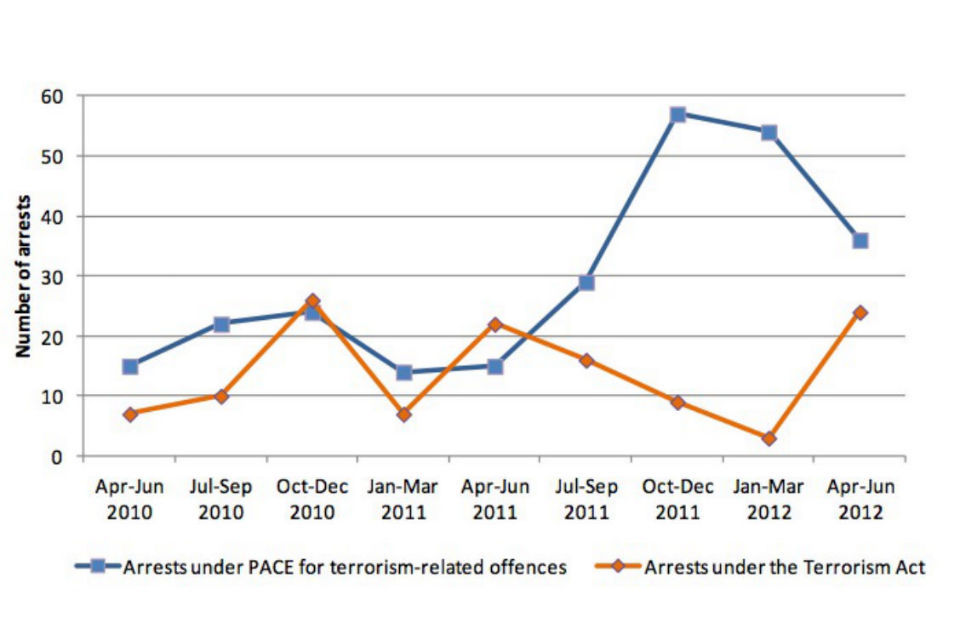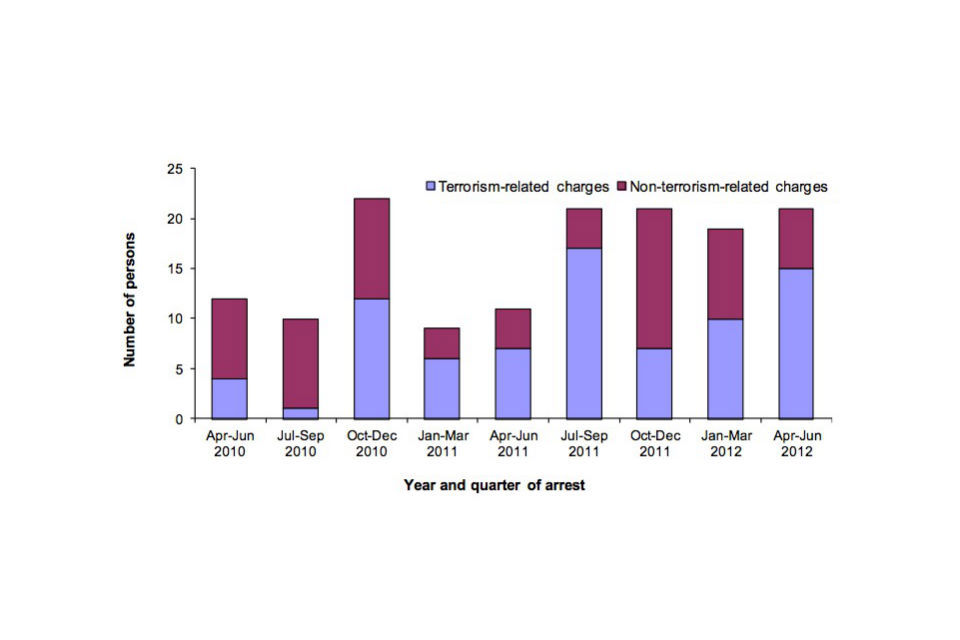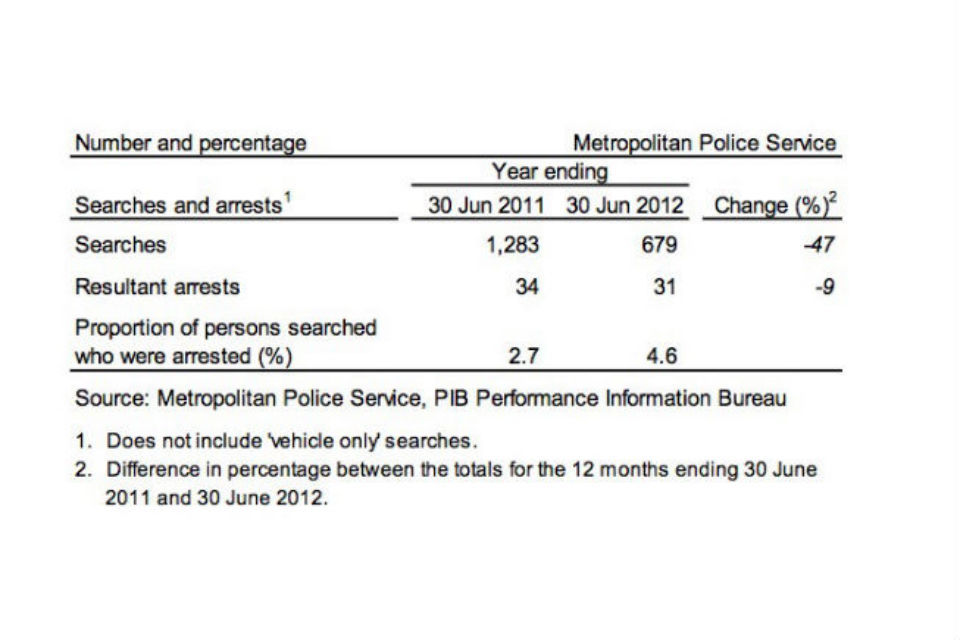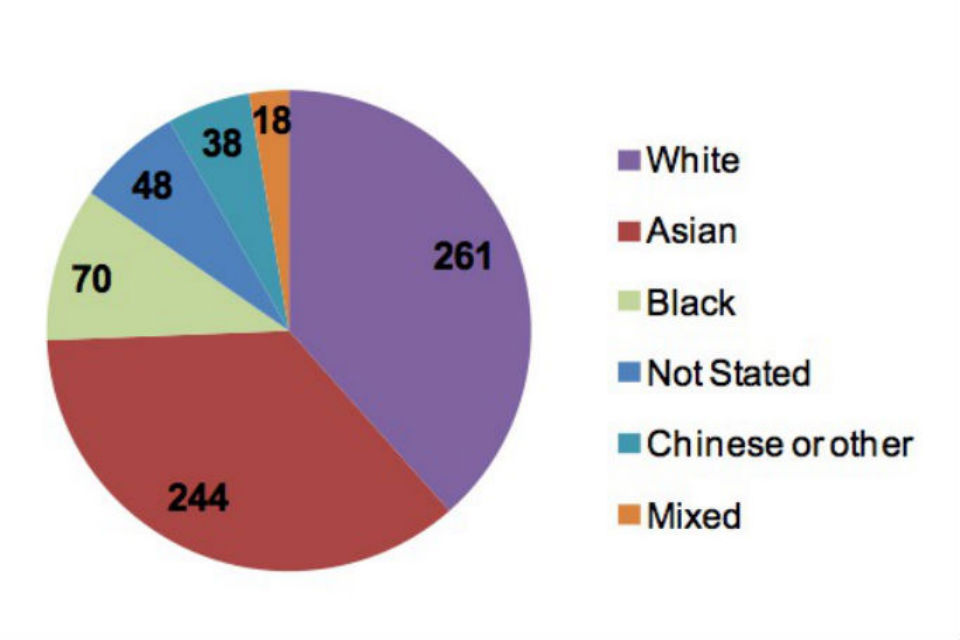Operation of police powers under the Terrorism Act 2000 and subsequent legislation: quarterly update to June 2012
Published 13 December 2012
The data were submitted to the Home Office by the Association of Chief Police Officers (ACPO), Crown Prosecution Service (CPS), National Offender Management Service, Scottish Prison Service (SPS) and police forces in Great Britain, and covers the period up to 30 June 2012.
Headline figures from the bulletin show that in the year ending 30 June 2012:
- There were 228 persons arrested in Great Britain for a terrorism-related offence
- Of those arrested, 49 persons were charged for a terrorism-related offence
- Of those arrested and charged for a terrorism-related offence, 20 were convicted of a terrorism-related offence, with a further 25 awaiting prosecution
- On 30 June 2012 there were 130 persons in prison custody for terrorism-related and extremist offences in Great Britain
- There has, as yet, been no use of new stop and search powers under section 47A of the Terrorism Act 2000 since they were formally brought into use on 18 March 2011
- The Metropolitan Police Service conducted 679 stops and searches under section 43 of the Terrorism Act 2000 in the year ending 30 June 2012, a fall of just under a half on the 1,283 in the previous year
Information about each section is available in the user guide to terrorism statistics.
The guide contains further information about the Terrorism Act 2000, explains categories and terminology used in the release and gives information about the data providers.
All related documents can be found in the series ‘Operation of police powers under the Terrorism Act 2000’
1. Arrests and outcomes
1.1 Introduction
Statistics are presented here on the number of persons arrested by police in Great Britain, where there is suspicion of involvement with terrorism (subsequently referred to as arrests for terrorism-related offences).
Outcomes of these arrests are also included up to the stage of prosecution, release, or other outcome. The information presented in this section is provided by the ACPO Counter Terrorism Co-ordination Centre (ACTCC) and covers the period up to 30 June 2012.
1.2 Arrests
In the year ending 30 June 2012, 228 persons were arrested for terrorism-related offences compared with 140 in the previous 12 months and a total of 2,231 since 11 September 2001.
Just under a quarter (23%) of terrorism-related arrests in the year ending 30 June 2012 were made under section 41 (s41) of the Terrorism Act 2000 (TACT), compared with 46% in the previous year and 72% since 11 September 2001.
The relatively small numbers of terrorism arrests each year mean that proportionally large fluctuations in arrests can result from particular police operations.
In the October to December 2011 quarter, however, the large number of arrests related to the policing of a demonstration, where a number of arrests were made under the Police and Criminal Evidence (PACE) Act 1984 for suspected terrorism-related offences.
1.3 Persons arrested for terrorism-related offences by type of arrest and quarter

Persons arrested for terrorism-related offences by type of arrest and quarter
Chart notes
Source: Home Office, Arrests and outcomes table A.01
1.4 Pre-charge detention under section 41 of the Terrorism Act 2000
When there is immediate suspicion of involvement with terrorist-related activity, the police have the option of arresting a person under s41 TACT, which allows detention for up to 14 days (as opposed to the maximum four days allowed under PACE).
The maximum detention period allowed under s41 TACT has varied in recent years; further information can be found in the user guide.
Three of the 52 persons arrested under s41 TACT in the year ending 30 June 2012 were held in pre-charge detention for more than seven days. Just under a third (17 persons) were dealt with within two days.
All of the 16 persons held in pre-charge detention for six days or more in the year ending 30 June 2012 were subsequently charged.
1.5 Charges and charging rates
Of the 228 persons arrested in the year ending 30 June 2012, 82 (36%) were charged, a similar proportion to the 52 out of 140 (37%) in the previous 12 months. This compares to 808 persons charged out of 2,231 persons arrested since 11 September 2001, a charging rate of 36%.
Of the 82 persons charged in the year ending 30 June 2012, 49 (60%) were for terrorism-related offences as compared with 50% in the previous 12 months and 62% since 11 September 2001.
1.6 Number of charges resulting from terrorism-related arrests, by quarter

Number of charges resulting from terrorism-related arrests, by quarter
Chart notes
Source: Home Office, Arrests and outcomes table A.02
1.7 Other outcomes of arrests
Of the 228 persons arrested in the year ending 30 June 2012, 109 (48%) were released without charge with 37 (16%) dealt with by alternative action. For the 140 persons arrested in the previous year the numbers and proportions were: 82 (59%) released without charge and six (4%) dealt with by alternative action.
Outcomes for all persons arrested for terrorism-related offences since 11 September 2001 are shown below.
1.8 Outcomes for persons arrested for terrorism-related offences from 11 September 2001 to 30 June 2012

Outcomes for persons arrested for terrorism-related offences from 11 September 2001 to 30 June 2012
Chart notes
Source: Home Office, Arrests and outcomes table A.03
1.9 Court outcomes
Of the 49 persons charged with terrorism-related offences in the year ending 30 June 2012, 25 were awaiting prosecution, with one not proceeded against. For the remaining 23 persons for whom trials were completed in the year ending 30 June 2012, 20 were convicted and three were found not guilty.
Since 11 September 2001, of the 499 persons charged for terrorism-related offences (shown in the chart above), 308 (62%) have been convicted.
1.10 Data tables
Data on persons arrested for terrorism-related offences, and the resulting charges and other outcomes, can be found in the arrests and outcomes data tables.
1.11 Data quality and interpreting the figures
In line with the normal procedures for criminal justice statistics, and in order to present an accurate count of the number of persons arrested and charged, data in this chapter have been presented on a principal offence basis. This means that, when a person is arrested or charged for multiple offences at the same time, the most serious offence is the one counted in these data. If a person arrested or charged is subsequently arrested on another occasion for a different offence, the additional arrest will also be counted in the data.
Due to the complex nature of terrorism investigations, a trial may take place several years after an arrest or charge takes place. Trials completed in 2012 can relate to arrests made in 2011 or earlier. Since the approach used in this section is based on time of arrest and the approach in the court proceedings briefing is based on time of trial outcome, data drawn from both may not be directly comparable.
The data presented are based on the position with cases as at the time of data provision for this release. As cases can change as a result of appeals, or as further information comes to light, figures for quarters previously published may be subject to amendment in this release.
For the first time in this release, final outcomes of the 21 charges made after examinations under Schedule 7 of TACT (shown in Table A.05) are included in Table A.07. As a result, data on the total number of convictions in this release are not directly comparable with convictions figures presented in previous bulletins.
Further information on the change can be found in the user guide.
2. Court proceedings
2.1 Introduction
This section shows data on the number of defendants tried by the CPS CPD, where the final trial outcome was reached between 1 October 2009 and 30 June 2012.
2.2 Key facts
Court proceedings for 30 defendants dealt with by the CPS were concluded in the year ending 30 June 2012, with 23 defendants convicted. Trials for 12 persons were concluded in the previous year, nine of which resulted in conviction.
All but one of the 23 defendants convicted in the year ending 30 June 2012 received custodial sentences (including one life sentence); the remaining person received a non-custodial sentence.
Nineteen of the 23 defendants convicted in the year ending 30 June 2012 pleaded guilty, compared with four of the nine persons in the previous 12 months.
2.3 Data tables
Data on court proceedings dealt with by the CPS can be found in the court proceedings data tables.
2.4 Data quality and interpreting the figures
In line with the normal procedures for criminal justice statistics, and in order to present an accurate count of the number of persons dealt with by the CPS, data in this section have been presented on a principal offence basis. This means that, when a person is proceeded against for multiple offences at the same time, the most serious offence is the one counted in these data. If a person is subsequently proceeded against on another occasion for a different offence, the additional case will also be counted in the data.
Due to the complex nature of terrorism investigations, trials may take place several years after an arrest or charge takes place. Trials completed in 2012 can relate to arrests made in 2011 or earlier. Since the approach used in the arrests and outcomes briefing is based on time of arrest and the approach in this section is based on time of trial outcome, data drawn from both may not be directly comparable.
3. Terrorist and extremist prisoners
3.1 Introduction
Data presented in this section are provided by the Ministry of Justice (MOJ) and SPS, and show the number of persons in who were in prison custody for terrorism-related offences and the number of domestic extremist prisoners in Great Britain at the end of each quarter from 30 June 2010 to 30 June 2012. This section also includes data on prisoners released between 1 April 2010 and 30 June 2012.
3.2 Key facts
There were 99 persons in prison for terrorism-related offences on 30 June 2012. Additionally, there were 31 prisoners in custody who were classified as domestic extremists/separatists.
In the year ending 30 June 2012, 43 prisoners being held for terrorism or domestic extremism-related offences were discharged from prison.
3.3 Data tables
Data on terrorist and extremist prisoners can be found in the terrorist and extremist prisoners data tables.
3.4 Data quality and interpreting the figures
Data on terrorist and extremist prisoners presented here include persons held on remand as well as those held after conviction and/or sentencing.
These data also include prisoners for historic terrorism cases originating from before 11 September 2001, who are not included in the arrests and outcomes topic page.
4. Stops and searches
4.1 Introduction
This section presents data on the number of uses of certain stop and search procedures under the Terrorism Act 2000 (TACT). The powers covered here are:
- stops and searches under section 44 (s44) of TACT (up to and including 17 March 2011) and searches under section 47A (s47A), the replacement power, from 18 March 2011 onwards. Data for searches under these powers presented cover the whole of Great Britain.
- stops and searches under section 43 (s43) of TACT – data for searches under this power presented cover the Metropolitan Police Service area only.
Information on the legislative background to these powers can be found in the user guide.
4.2 Stops and searches under sections 44 and 47A of the Terrorism Act 2000
Stops and searches under s44 and s47A of TACT apply to situations where police require the power to stop and search persons in specific areas for terrorism-related activity where there is no direct suspicion of involvement in terrorism. On 18 March 2011, all s44 powers were formally replaced with s47A stop and search powers. The user guide explains the background to this change.
No stops and searches under these powers were conducted in the year ending 30 June 2012.
4.3 Stops and searches under section 43 of the Terrorism Act 2000
Also available to the police are powers of stop and search under s43 of TACT, where an officer does not need an authorisation as under s44/47A, but instead should have reasonable suspicion that the person is involved in terrorist-related activity.
A total of 679 persons were stopped and searched under s43 by the Metropolitan Police Service in the year ending 30 June 2012, down from 1,283 in the previous 12 months, a fall of just under half (47%).
Of the 679 searches made in the year ending 30 June 2012, 31 (5%) resulted in arrest.
4.4 Stops and searches of persons by the Metropolitan Police Service under s43 of the Terrorism Act 2000, and resultant arrests

Stops and searches of persons by the Metropolitan Police Service under s43 of the Terrorism Act 2000, and resultant arrests
Chart notes
Source: Home Office, Stops and searches table SS.01
4.5 Section 43 searches by self-defined ethnicity
The proportion of persons stopped and searched by the Metropolitan Police Service under s43 TACT who classified themselves as Asian or Asian British increased from 34% in the year ending 30 June 2011, to 36% (244 persons) in the year ending 30 June 2012. During the same period, the proportion of persons searched describing themselves as White remained at 38% (261 persons). The proportion of persons searched who self-classified as Black or Black British rose by two percentage points, from 8 to 10% (70 persons). A full breakdown of self-defined ethnicities in the year ending 30 June 2012 can be seen below.
4.6 Number of section 43 searches conducted by the Metropolitan Police Service in the year ending 30 June 2012, by self-defined ethnicity

Stops and searches of persons by the Metropolitan Police Service under s43 of the Terrorism Act 2000, and resultant arrests
Chart notes
Source: Home Office, Stops and searches table SS.02
4.7 Data tables
Data on stops and searches can be found in the stops and searches data tables.
